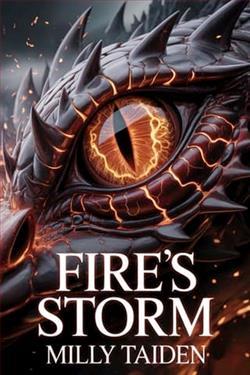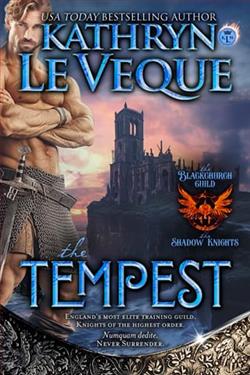Page 12 of Owned By the Orc Warlord
Thresh is quiet for a long moment, considering his answer. "Because I've seen the way he looks at you," he says finally. "And I've seen the way you look at him. There's something there, but you're both too stubborn and scared to name it."
Heat blooms in my cheeks at his blunt assessment. "You're imagining things."
"Am I?" He shifts closer, lowering his voice to barely above a whisper. "Rogar has never brought a female backto the settlement. Never shown interest in taking a mate, despite pressure from the elders. But you appear, and suddenly he's hovering around the training grounds, watching every interaction, ready to tear apart anyone who threatens you."
"He's protecting a political asset," I protest, but the words sound hollow even to me.
"Political assets don't make him forget to eat. They don't make him pace his tent like a caged beast when you're out of his sight. And they definitely don't make him look like someone kicked his favorite war mount when you withdraw from conversation."
The detailed observations suggest Thresh has been watching far more closely than his casual demeanor would indicate. Either he's naturally perceptive, or the entire clan has noticed the strange dynamics developing between their chieftain and his human refugee.
"Even if you're right," I say carefully, "what difference does it make? I'm human. He's orc. I'm a former slave with enemies who want me dead. He's a clan leader with responsibilities to his people. Nothing can come of whatever... connection... might exist."
"Can't it?" Thresh's eyes gleam with something that might be mischief. "The clan laws speak of strength, not species. If a female proves herself worthy through combat and service, her bloodline becomes irrelevant."
The possibility he's suggesting makes my pulse quicken despite every rational argument against it. Could I actually earn a place here? Not as a tolerated refugee or useful tool, but as a genuine member of the Stormfang Clan?
And what would that cost?
The question cuts through my momentary hope like ice water. Acceptance would mean abandoning any thought of escape, of seeking freedom in distant lands. It would meanbinding my fate to these people, accepting their conflicts as my own, fighting their battles until death claimed me.
It would mean trusting Rogar completely, revealing vulnerabilities I’ve been learning to hide for years.
"Khela thinks you could be ready for the warrior trials within a year," Thresh continues, apparently oblivious to my internal struggle. "Maybe less, if you keep improving at today's pace. And if you passed those trials..."
"I'd still be human," I point out. "Still be the escaped sacrifice who brought dark elf attention to your territory."
"You'd be a Stormfang warrior who happened to be born human," he corrects. "There's a difference."
Is there, though? Would clan membership truly erase the fundamental reality of what I am? Or would I always be the exception, the outsider who was grudgingly accepted but never fully trusted?
The questions swirl through my mind without easy answers. Part of me wants to embrace Thresh's optimistic vision, to believe that strength and determination might overcome the barriers of birth and circumstance. But another part—the part that's learned caution through painful experience—whispers warnings about the dangers of hope.
"Why do you care?" I ask. "What's it to you whether I stay or go?"
Thresh's expression grows serious, the youthful enthusiasm fading into something more mature. "Because the clan needs what you represent," he says quietly. "Not just your skills or potential, but the reminder that strength comes in many forms. We've grown isolated, suspicious of anything that doesn't fit our traditional patterns. Your presence forces us to question assumptions we've held for generations."
"And if questioning those assumptions proves destructive?"
"Then we adapt or die. But at least we die learning instead of stagnating."
His words echo with wisdom that seems too old for his years. How many conversations like this has he witnessed? How many changes has his generation struggled to navigate in a world that's shifting faster than tradition can accommodate?
"The chieftain needs you too," Thresh adds after a moment. "Not just as a warrior or political asset, but as someone who challenges him to be better than he is. You make him think, make him question, make him want things he's never allowed himself to consider."
"That sounds dangerous."
"The best things usually are."
Movement from across the chamber signals that our whispered conversation has begun to disturb other sleepers. Thresh settles back onto his bedroll, but his final words carry clearly in the darkness.
"Don't run, Zahra. Not yet. Give this place a chance to become home before you decide it's impossible."
His breathing evens out quickly, leaving me alone with thoughts that refuse to settle. Home. The word tastes foreign on my tongue, sharp with longing I'd thought beaten out of me years ago. Is it possible? Could I find belonging among these fierce, complicated people?
Trust is a luxury slaves can't afford.
My mother's voice whispers the warning that had kept us both alive in Liiandor's treacherous hierarchy. Trust meant vulnerability, and vulnerability meant death. But hiding behind walls had its own costs—isolation, emptiness, the slow erosion of everything that made life worth living.















